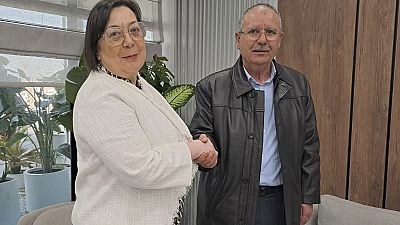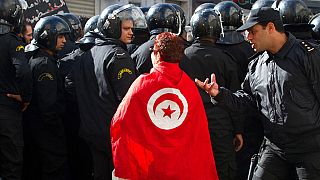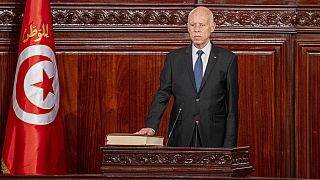Tunisia
President Kais Saied of Tunisia ordered Europe's top trade union official to leave the North African country after she addressed protesters at a demonstration organized by an influential labour union.
Authorities accused Esther Lynch, the Irish general secretary of the European Trade Union Confederation, of making statements that “interfered with Tunisian internal affairs” during a Saturday protest against Saied in the port city of Sfax.
Tunisia's General Labor Union, or UGTT, organized the demonstration to protest a crackdown on the increasingly authoritarian president's political opponents and his critics in the media, judiciary, business community and trade unions.
In an address to the protesters, Lynch demanded the release of union leader Anis Kaabi, who was arrested by security forces last month.
She called on the Tunisian government to negotiate with the UGTT leadership and to improve the economy, which has teetered on the brink of bankruptcy amid political instability that deepened after a parliamentary election last month in which only 11% of voters cast ballots.
“By orders of the president, Tunisian authorities ordered Esther Lynch to leave the country within 24 hours, following statements made during the UGTT-led demonstration that interfered with Tunisian internal affairs,” said a statement by the Tunisian presidency that was posted on Twitter late Saturday.
The European Trade Union Confederation (or the ETUC confirmed that Lynch left Tunisia on Sunday.
The treatment of Lynch by the Tunisian authorities “is in line with the campaign of intimidation and harassment being waged against trade unions by President Kais Saied,” including “arrests, sacking of union officials (and) malicious lawsuits," the ETUC said in a statement.
“These tactics are part of a campaign by President Saied to break the union's resistance to policies which are making ordinary people pay for the country's economic, social and constitutional crisis,” the statement said.
Saied won the presidency in a 2019 landslide on a promise to improve the country's economy. Instead, the president appears determined to upend the country's political system, threatening a democracy once seen as a model for the Arab world and sending the economy toward a tailspin.
In December, the International Monetary Fund froze an agreement on a $1.9 billion loan for Tunisia. The deeply indebted government needs the funds to pay UGTT-represented public sector salaries and to fill budget gaps aggravated by the COVID-19 pandemic and the fallout from Russia's war in Ukraine.
In recent months, Tunisians have been hit with soaring food prices and shortages of fuel and basic staples like sugar and vegetable oil.












01:16
Ugandan opposition politician kidnapped and jailed, his wife says
01:08
Mozambique: Opposition leader Venancio Mondlane faces legal action
01:10
Senegal parliamentary elections: Polls open, over 7 million expected to vote
01:00
Tunisia: French student detained for weeks, flies back home
01:00
Somaliland counts votes after pivotal election
01:03
Senegal’s legislative elections: Prime minister calls for retaliation against “attacks” on supporter